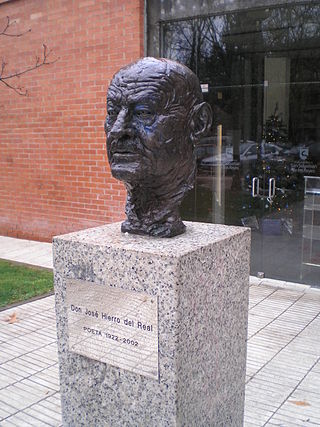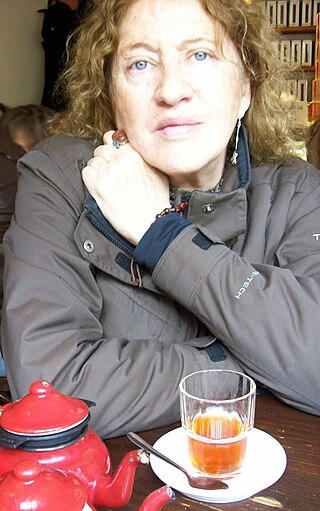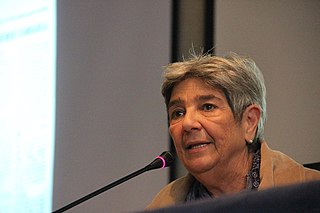Related Research Articles

José Hierro del Real, sometimes colloquially called Pepe Hierro, was a Spanish poet. He belonged to the so-called postwar generation, within the rootless and existential poetry streams. He wrote for both Espadaña and Garcilaso magazines. In 1981, he received the Prince of Asturias Awards in Literature, in 1998 the Cervantes Prize and he received many more awards and honours.

Route 8 is a national route of Uruguay. In 1975, it was assigned the name Brigadier General Juan Antonio Lavalleja, a national hero of Uruguay. It connects Montevideo with Aceguá in the northeast.

In Francoist Spain, at least two to three hundred concentration camps operated from 1936 until 1947, some permanent and many others temporary. The network of camps was an instrument of Franco's repression.

Claudia Fabiana Fernández Viera is a Uruguayan award-winning television presenter, fashion model, actress and businesswoman. Born in Punta de Rieles – Bella Italia, Montevideo she began her career as a model in her teens and participated in numerous advertising campaigns. In the late 1990s, she began working on television, on the show Dale que Podés. She also participated in the reality show Bailando por un Sueño, and in the talk show Animales Sueltos, both in Argentina.

Mirta Gloria Yáñez Quiñoa is a Cuban philologist, teacher and writer. She graduated from high school in Raúl Cepero Bonilla Special Pre-university Institute where she was considered a high-performing student. She entered the University of Havana in 1965, graduating five years later. She earned a PhD in philology (1992) at the same university, specializing in Latin American and Cuban literature, as well as in studies on Cuban women's literary discourse. She worked for many years teaching and conducting research at the University of Havana.

Gerardo González Valencia is a Mexican suspected drug lord and high-ranking member of the Jalisco New Generation Cartel (CJNG), a criminal group based in Jalisco. He is part of a clan that heads a CJNG money laundering branch known as Los Cuinis. He was allegedly responsible for coordinating international money laundering schemes by using shell companies to purchase assets in Latin America, Europe, and Asia. His wife Wendy Dalaithy Amaral Arévalo was reportedly working with him on this large money laundering scheme when the couple moved from Mexico to Uruguay in 2011.
Gladys Ethel Parentelli Manzino is a Uruguayan feminist theologian and photographer who has lived in Venezuela since 1969. A representative of Latin American ecofeminism, she was one of three Latin American women appointed by Pope Paul VI as observers at the Second Vatican Council.
María Clara Berenbau Giuria, also known as Clarita Berenbau, was a Uruguayan presenter, announcer, columnist, actress, writer, and journalist.
Charna Furman is a Uruguayan architect noted for her design of a communal women's housing project designed to create affordable housing for single mothers. As a prisoner, confined during the Uruguayan Dictatorship, she has become an advocate for people deprived of their civil liberties and participated in the creation of a film regarding her ordeal.

Mariam Budia Spanish writer, researcher, and playwright.
Edda Fabbri is a Uruguayan writer. She was awarded the Casa de las Américas Prize for her testimonial novel Oblivion, which narrates her experiences as a political prisoner of the civic-military dictatorship of Uruguay.

Rita Laura Segato is an Argentine-Brazilian academic, who has been called "one of Latin America's most celebrated feminist anthropologists" and "one of the most lucid feminist thinkers of this era". She is specially known for her research oriented towards gender in indigenous villages and Latin American communities, violence against women and the relationships between gender, racism and colonialism. One of her specialist areas is the study of gender violence.
Sonia Cristina Montecino Aguirre is a Chilean writer and anthropologist. In 2013, she was awarded the Premio Nacional de Humanidades y Ciencias Sociales

Teresa Amy was a Uruguayan teacher, poet, and translator.
Orfila Bardesio was a Uruguayan poet and educator.

Lilián Celiberti is a Uruguayan feminist activist. She became a political prisoner under the military dictatorship and lived in exile in Italy. She is a founding member and coordinator of the feminist collective Cotidiano Mujer, and she is also a leader in Articulación Feminista Marcosur, which promotes the development of a feminist political platform at the regional and global level.

Mirta Tundis is an Argentine journalist and politician who served as a National Deputy elected in Buenos Aires Province. A member of the Renewal Front, she was first elected in 2013 and re-elected in 2017.

Mirta Núñez Díaz-Balart is a Cuban-Spanish historian.
Giannina Carla Silva Varela is a Uruguayan television presenter, model, former beauty pageant titleholder and actress.
References
Citations
- 1 2 3 4 "Adiós a Mirta Macedo". Uypress (in Spanish). 25 July 2012. Archived from the original on 3 February 2019. Retrieved 2019-02-02.
- 1 2 3 4 5 Pagola, Florencia. "Cada uno tenía su mujer". Sala de Redacción (in European Spanish). Archived from the original on 12 November 2018. Retrieved 2019-02-02.
- 1 2 Sapriza, Graciela (March 2008). "Palabras y silencios sobre el terrorismo de estado" (PDF). Encuentros Latinoamericanos (in Spanish). 2 (2): 83.
- 1 2 Forcinito 2019, p. 148.
- ↑ Rivero, Elizabeth G. (2016). "Gendered Memories and Visual Recollections". In Gómez, Tania; Bolaños-Fabres, Patricia; Hennessy, Christina Mougoyanni (eds.). Gender in Hispanic Literature and Visual Arts. Lanham, Maryland: Lexington Books. p. 138. ISBN 9781498521208.
- ↑ Alzugarat, Alfredo. "Atando los tiempos". Espacio Latino (in Spanish). Retrieved 2019-02-03.
- ↑ Forcinito 2019, p. 154.
- ↑ Kanopa, Agustín Acevedo (2016-08-25). "Entre "nosotras" y "ellos"". La Diaria (in Spanish). Retrieved 2019-02-03.
- ↑ Forcinito 2019, p. 157.
Sources
- Forcinito, Ana (2019). Intermittences: Memory, Justice, and the Poetics of the Visible in Uruguay . Pittsburgh: University of Pittsburgh Press. ISBN 9780822986362 – via Project MUSE.